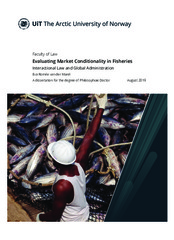Evaluating Market Conditionality in Fisheries: Interactional Law and Global Administration
Permanent link
https://hdl.handle.net/10037/20584Date
2020-01-24Type
Doctoral thesisDoktorgradsavhandling
Author
van der Marel, Eva RoméeAbstract
Market measures in general command a degree of support by the international community, and have in particular become part of the global effort to prevent, deter, and eliminate IUU fishing. The EU, the largest market power in fish products in the world, is leading the way on this front, spear-heading country blacklisting mechanisms under the IUU and Non-Sustainable Fishing Regulations. Other important fisheries markets are moreover being encouraged (and some are interested) to follow suit. The EU’s measures are shown to have significant actual and potential transboundary impacts, especially on developing countries, which struggle most with IUU fishing and constitute the main target of the EU’s mechanisms. This thesis seeks to better understand how market conditionality in fisheries works, and to consider the legal issues to which such mechanisms give rise. Given that there is no indication that the international community considers unilateral, country-level market conditionality to be an appropriate tool to promote compliance with international fisheries norms, there is a need to think normatively about the conditions under which such mechanisms can be justified.
Publisher
UiT The Arctic University of NorwayUiT Norges arktiske universitet
Metadata
Show full item recordCollections
Copyright 2020 The Author(s)
The following license file are associated with this item:


 English
English norsk
norsk
